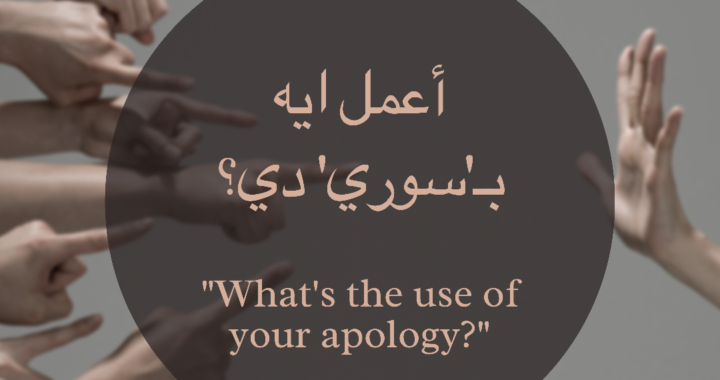Sorry?
“أعمل إيه بـ'سوري' دي؟"
“What’s the use of your apology?”
I came across this “question” among some comments this morning, in response to someone apologizing for a mistake he’s done a few years back, and it triggered me so bad. Because growing up, this is one of the sentences I’ve often heard whenever I found it in me to say sorry, and that has made it really hard for me to apologize over the years. Even worse, it has made it hard to admit that I make mistakes, and I’d always unconsciously avoid anything that could possibly result in one. Because mistakes are obviously irredeemable. And often unforgivable, too.
It reminded me of another post I’ve read around two years ago, where a father was telling the story of how his son spilled water over his expensive laptop. Instead of going crazy about it, he decided to give his son a hug and show him how the laptop looks like from the inside, so he’d learn something new anyway. As they brought everything out and dried them up together, he calmly explained why the water can destroy a device like that. And when they put everything back in place, they were surprised that the laptop actually worked again. He was basically reflecting on the fact that his number one priority was to avoid guilt-tripping his son, and to make him feel safe, before he could show him the impact of his mistake and why he’d want to avoid getting laptops in contact with water going forward. I was smiling all through the post, until I read the first comment where someone else said “I’m sorry but this was your mistake, you shouldn’t have left the laptop on the floor in the first place,” and it triggered me just as bad as this morning’s comment did.
Besides the fact that I need to seriously stop checking the comments section altogether, I really don’t get how we continue to expect human beings to never make mistakes this way, and how we admire calling them out for things we know they already aren’t proud to have done. It’s like everyone’s supposed to leave their mother’s womb having learned everything there is to learn about the world, because there’s no room here for growing and evolving. Despite how we personally change over the years, our fingers still unconsciously look for a face to point at with every other mistake, because someone has to start beating themselves up for anything that slightly goes wrong. If there’s no one to blame, it might mean we’d have to beat our own selves up, which we’ll forever try to avoid at all costs – even though it’s not even necessary at all.
We don’t realize how lucky we are that most of our mistakes only happen in private. And every time we beat ourselves up for one, we grow quite impatient with anyone else’s potential to err or not meet the expectations we unrealistically set for them. We’ve mastered grilling those whose mistakes are louder than ours. And we dislike seeing other people’s flaws so clearly, because it will only highlight we’re all human beings at the end of the day. Human beings who make mistakes so they can learn. Human beings who weren’t sent here so they can turn this into a perfect place. Human beings who will never be able to be patient with anyone unless they learn to be patient with themselves first.
If you’ve ever asked this question yourself, well, there’s so much that you can do with a genuine apology. You can let it sink in, you can allow the person a second chance. You can applaud them for being able to look back and admit they’ve done something wrong. You can make them feel safe, supported and accepted so you’d set a better precedent for anyone else who might need to apologize later on. You can smile and let it go. You don’t always have to forgive or ignore the consequences, but you can learn to be gentle. Because we’re all struggling here. And before you know it, you’ll shortly need someone to be gentle with you, too.



